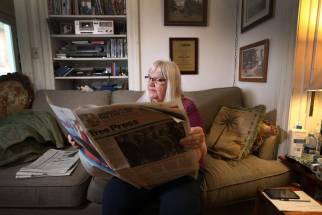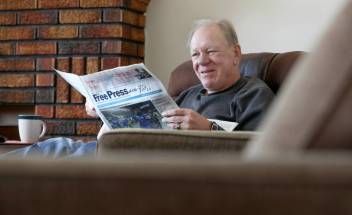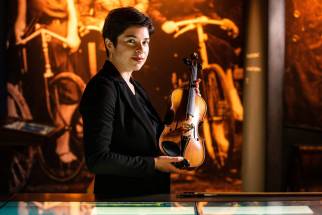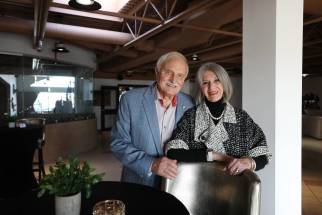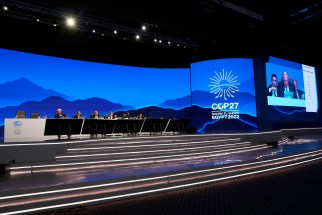Strings eternal Hope-filled WSO concert features lovingly reburbished violins with ties to the Holocaust
Read this article for free:
or
Already have an account? Log in here »
To continue reading, please subscribe:
Monthly Digital Subscription
$0 for the first 4 weeks*
- Enjoy unlimited reading on winnipegfreepress.com
- Read the E-Edition, our digital replica newspaper
- Access News Break, our award-winning app
- Play interactive puzzles
*No charge for 4 weeks then price increases to the regular rate of $19.00 plus GST every four weeks. Offer available to new and qualified returning subscribers only. Cancel any time.
Monthly Digital Subscription
$4.75/week*
- Enjoy unlimited reading on winnipegfreepress.com
- Read the E-Edition, our digital replica newspaper
- Access News Break, our award-winning app
- Play interactive puzzles
*Billed as $19 plus GST every four weeks. Cancel any time.
To continue reading, please subscribe:
Add Free Press access to your Brandon Sun subscription for only an additional
$1 for the first 4 weeks*
*Your next subscription payment will increase by $1.00 and you will be charged $16.99 plus GST for four weeks. After four weeks, your payment will increase to $23.99 plus GST every four weeks.
Read unlimited articles for free today:
or
Already have an account? Log in here »
Hey there, time traveller!
This article was published 25/11/2022 (1115 days ago), so information in it may no longer be current.
If a picture tells a thousand words, then a musical instrument connected to the horrors of the Holocaust can sing a harrowing song of hope, fear and resilience — and ultimately, survival.
CONCERT PREVIEW
VIOLINS OF HOPE
● Saturday, Dec. 3
● 7:30 p.m.
● Centennial Concert Hall.
● Tickets at: wso.ca
The Winnipeg Symphony Orchestra, with support from the Jewish Foundation of Manitoba, presents Violins of Hope as its latest (B)eyond Classics concert on Saturday, Dec. 3, featuring WSO concertmaster Gwen Hoebig and first violinist Sonia Lazar performing on two violins that once belonged to Jewish musicians who perished at the hands of the Nazis.
WSO artistic consultant James Manishen and Shelley Faintuch — a well-known local leader in Israel-related programs and activities, and a child of Holocaust survivors — will host the moving program led by maestro Daniel Raiskin.
“It’s an incredibly meaningful project,” Raiskin says over the phone from Bratislava, where he also serves as principal conductor of the Slovak Philharmonic Orchestra. “For so many people in concentration camps, music was often their only means of retaining any kind of hope. It meant more than the occasional food or water they were given, and symbolizes this incredible spirit in which you can’t destroy something that doesn’t belong to you, including the right to play or compose music, or make choices about which language and religion you wish to adhere to.
“Each one of these instruments tells a story about the Jewish people and their love of life. While their owners might no longer be with us, their violins are still here.”
The fiddles are part of an ever-growing private collection of 60 violins, violas and cellos amassed since the end of the Second World War, lovingly restored by Israeli-raised father-and-son luthiers Amnon and Avshalom Weinstein as part of their ongoing passion project of concerts and educational outreach activities called Violins of Hope.
MIKAELA MACKENZIE / WINNIPEG FREE PRESS First violinist Sonia Lazar will perform the theme from Schindler’s List with the WSO next Saturday.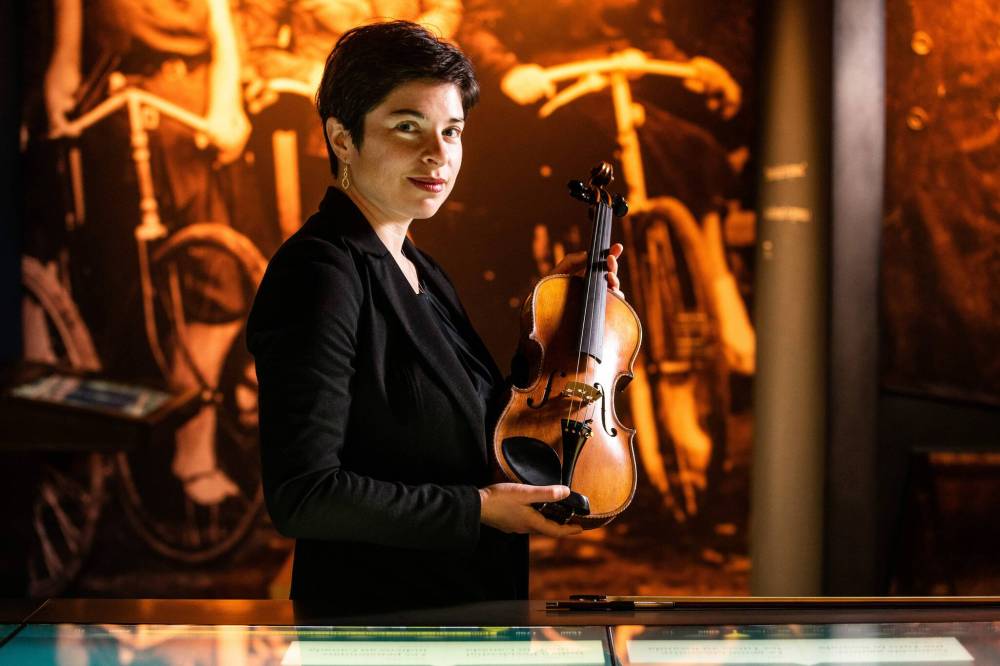
The project had its genesis after a young man brought his grandfather’s violin to the elder Weinstein for repair. When opening its cavity, he was shocked to find black powder inside, immediately recognizing it as ashes from the crematorium where the man’s grandfather had last played the violin.
That gruesome discovery spurred him to collect more violins from the Holocaust, learning their dark truths from their current owners.
The string instruments now travel the world to have new life breathed into them as musical ambassadors, serving as a testament to the power of the human spirit to transcend evil.
The Alberta-raised Lazar, who joined the WSO in 2016, has performed Jewish klezmer music since age 10, delighting seniors in long-term care homes with its life-affirming melodies as well as making guest appearances with Calgary’s wittily titled Take the Oy Train.
MIKAELA MACKENZIE / WINNIPEG FREE PRESS The “Klezmer” violin is part of a collection of violins and cellos with ties the Holocaust that make up the Violins of Hope project, spearheaded by Israeli luthiers Amnon and Avshalom Weinstein.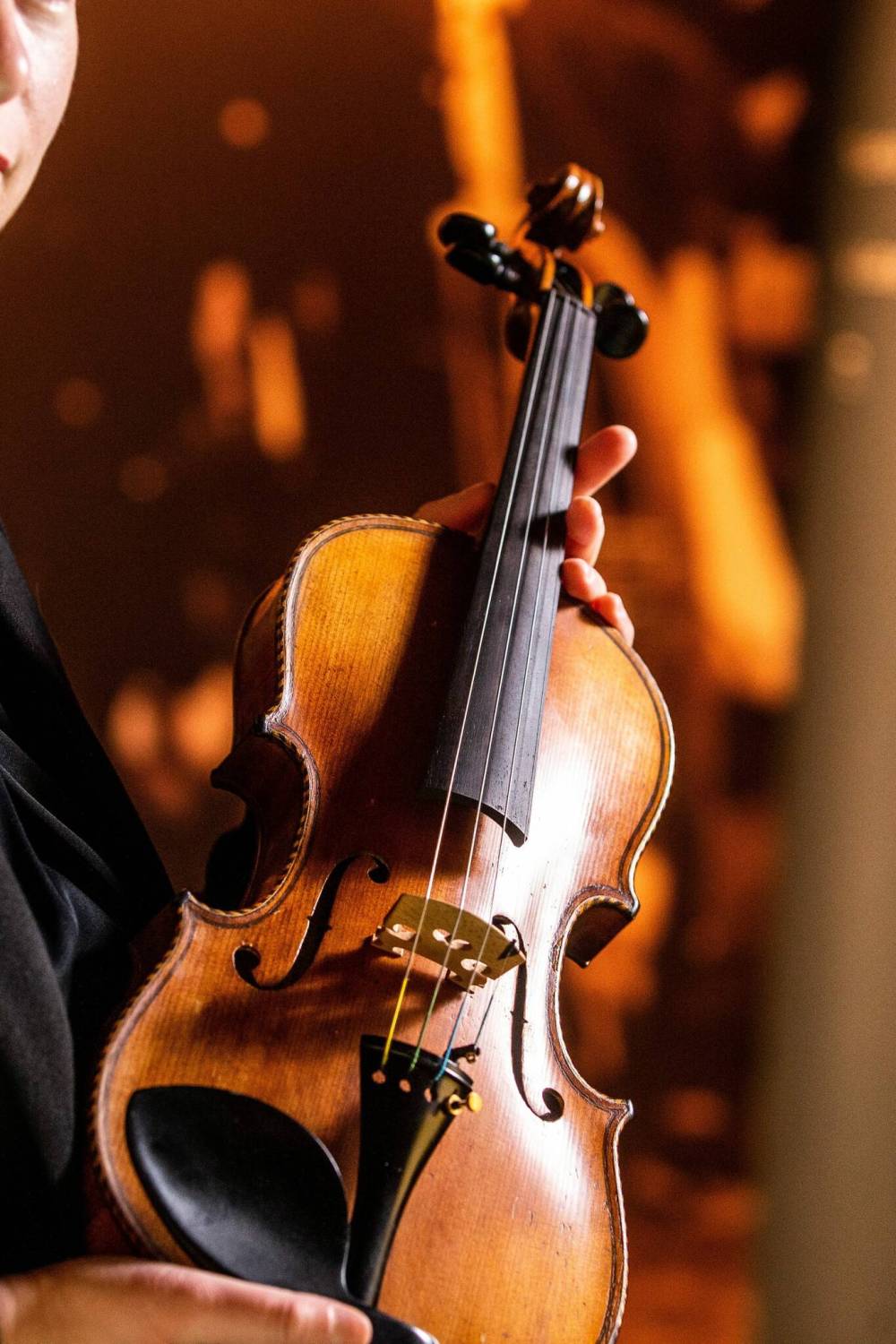
Fittingly, Lazar will be performing on the collection’s “Klezmer” violin, first laying hands on the instrument last week after a WSO staff member made a whirlwind trip to New York City to personally pick up the violins with their papers — too precious a cargo to ship to our Prairie city.
Her playlist for the upcoming concert includes John Williams’ searing theme from Schindler’s List, certain to leave no eye dry.
“It’s such a beautiful piece of music, and a lot of people will recognize it as the theme from this very powerful movie about how the Jews were rescued by Oskar Schindler,” Lazar says of American director Steven Spielberg’s 1993 historical masterpiece. “But the film is also a strong reminder of how many people could not be rescued, and how many people died.”
Her second piece will be the lesser-known Hebrew Melody, Op. 33, written by Russian-born composer Joseph Achron and based on a Jewish folk melody.
“It’s slow and fun and sounds like something somebody could sing. It’s a very moving piece and is quite expressive,” the violinist says of the soulful work so richly evocative of Jewish cantorial music, arranged for solo violin, harp and strings.
Hoebig’s designated violin, the “Hecht,” boasts a unique Canadian connection, originally belonging to Alex and Fanny Hecht, and their two sons, Fritz and Ernest, who lived in Billefeld, Germany, until fleeing to Amsterdam to escape the Nazis.
Fanny, a violinist, befriended Helena Visser and her daughter Helena, who lived above them at the time.
MIKAELA MACKENZIE / WINNIPEG FREE PRESS A Star of David is embossed on the back of many of the instruments donated to the Violins of Hope project.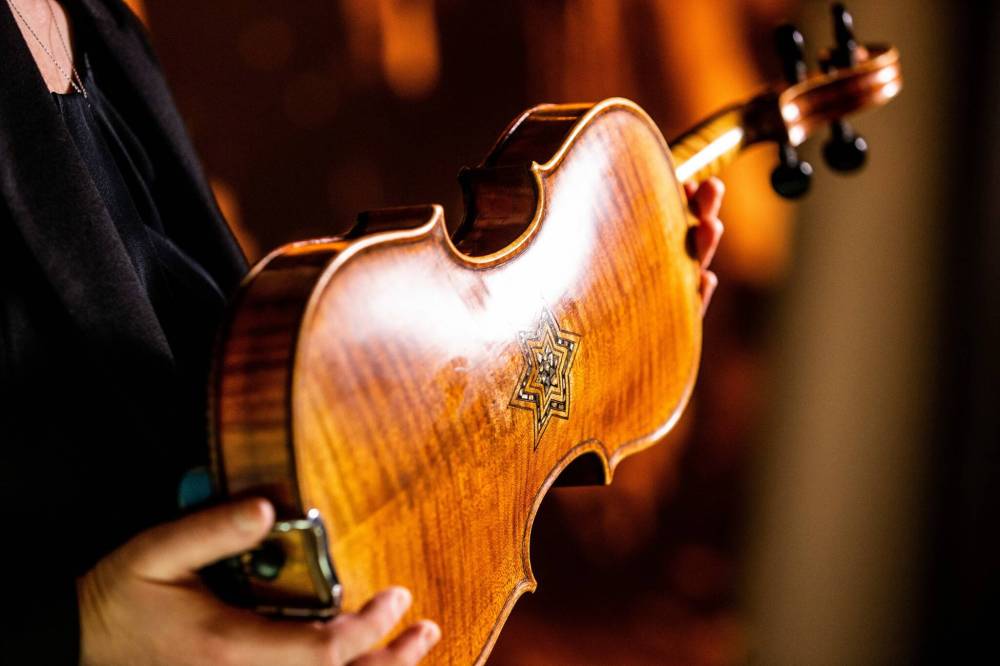
As the Nazis rounded up Jews for deportation to the gas chambers of Auschwitz, Fanny entrusted the violin to Helena until her return, which, of course, never happened.
The Vissers faithfully kept their promise for 74 years, with the younger Helena eventually moving to Canada with the violin. After hearing about Violins of Hope, the Vissers finally discovered the tragic fate of their dear friends after researching the family at Israel’s Yad Vashem Holocaust Remembrance Centre, which led to their gifting the violin to the Weinsteins.
“I am very excited to have the opportunity to play this instrument with such incredible history,” Hoebig says in a release. “The fact that this instrument survives is a testament to the Jewish people who faced incredible horrors throughout the Second World War. It will be very moving to make the instrument sing again in (the Hecht family’s) honour.”
Lazar feels her own sympathetic vibrations with the project. Her maternal great-grandfather fought in the Second World War alongside his 19-year-old son, while her grandmother, then 10, was forced to give up her violin studies after being displaced from her home in St. Petersburg, Russia. She lived in an orphanage throughout the war as her physician mother tended to soldiers.
It was her grandmother’s dream that her granddaughter follow in her musical footsteps, which Lazar has taken to heart since childhood.
“Music gives us hope. Even during those darkest of times, there were orchestras in the camps and people were making music, because they had something to live for.”–Sonia Lazar
She is also deeply aware of the privilege, as well as weight of responsibility in being invited to perform on the violin, “feeling all the feels,” as she steps out of her string section into the limelight as soloist, describing it as a “humbling” experience.
In an increasingly complex world riddled with rising antisemitism — yet again — the Russian-born Lazar, who also lived briefly on an Israeli kibbutz before arriving in Canada with her parents, grows reflective when asked what “hope” means to her personally, and why it’s even more critical today.
“It’s important to have hope, because it’s what keeps us moving forward,” she says simply. “Music gives us hope. Even during those darkest of times, there were orchestras in the camps and people were making music, because they had something to live for. That hope helped them survive, as music can tap into beautiful and positive emotions for people, and especially when you have an entire room full of listeners who are feeling the exact same thing at the same time.”
MIKAELA MACKENZIE / WINNIPEG FREE PRESS Lazar will be performing on the collection’s “Klezmer” violin, first laying hands on the instrument last week after a WSO staff member made a whirlwind trip to New York City to personally pick up the violins.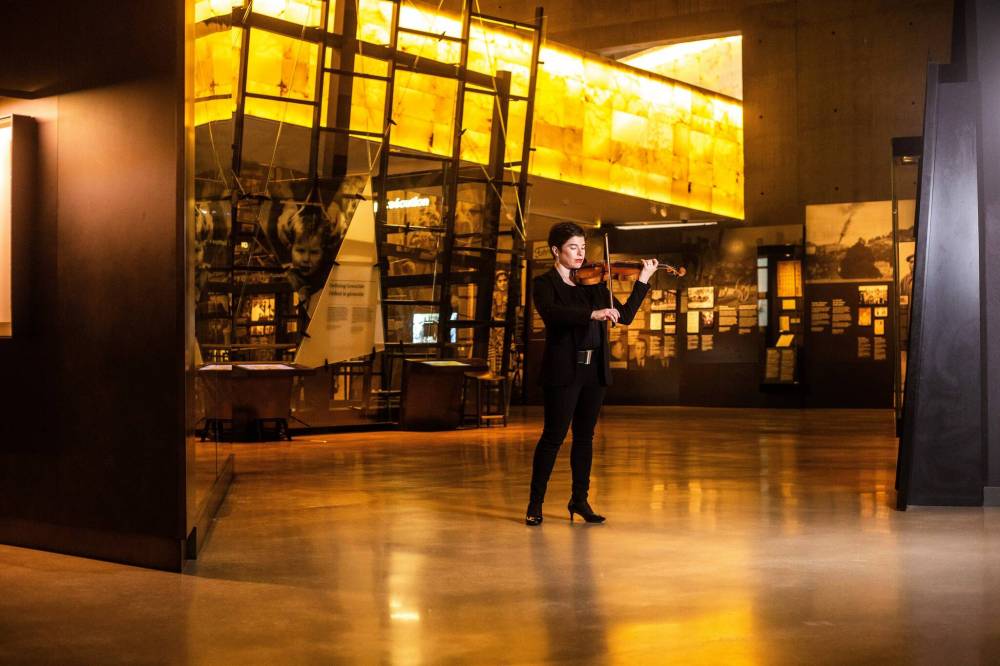
However, the concert, which also includes Brahms’ Symphony No. 3 in F major, Op. 90, among other works, takes that sentiment one step further. Not only will audience members be connected to the performers onstage that night, but to all those souls no longer with us, and whose instruments, many inlaid with the Star of David symbol by their original builders, now give them voice generations later as a potent legacy.
“I would like them to know that they did not die in vain, and that their lives and stories are being remembered in the best way that we can, through music,” Lazar reflects when asked what she would share with them today, if they were still alive. “I would also tell them that Hitler did not succeed, and that the Jewish community is still here, and has survived.”
After next weekend’s performance, which includes an extended pre-show chat beginning at 6:40 p.m. featuring Hoebig, Lazar, Faintuch and Raiskin, the “Hecht” violin will be displayed in an exhibition at the Canadian Museum for Human Rights until March 2023.
Violins of Hope will be performed Saturday, Dec. 3, at 7:30 p.m. at the Centennial Concert Hall. For tickets or more information, visit wso.ca.
holly.harris@shaw.ca


